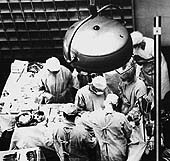
THURSDAY, Aug. 19 (HealthDay News) — A new British study finds that transplanted kidneys from patients whose hearts have stopped beating perform just as well as those from patients who are brain-dead but still alive.
Surgeons have been concerned that kidneys from patients whose hearts have stopped may be weaker and less durable.
In the new study, professor J. Andrew Bradley, of the University of Cambridge, and colleagues studied a database of 9,134 kidney transplants from 2000 to 2007. Of those, 845 were from people whose heart stopped beating after a decision to withdraw life support; the rest were from brain-dead patients.
The study, published online by the The Lancet, showed that the kidneys of both types performed equally well at one and five years after transplantation — in terms of their survival in the body — in patients who’d received transplants for the first time.
“Kidneys from controlled cardiac-death donors provide a good outcome in terms of both graft survival and graft function in first-time recipients and should be regarded as equivalent to kidneys from brain-death donors,” the researchers wrote. “The factors shown to affect transplant outcome for kidneys from cardiac-death donors will help to guide clinical decision making and inform future allocation policy.”
Dr. Jonathan S. Bromberg, a transplant specialist at the Mount Sinai Medical Center in New York City, said that other research has also shown that transplanted organs perform about the same, regardless of whether they’re from dead or brain-dead donors.
There are some challenges to removing organs from patients whose hearts have stopped beating, Bromberg said. They’re more likely to have certain kinds of damage, he said, and “therefore, great care must be taken to procure the organs carefully, to shorten the preservation time as much as possible, and to match the donor organs with recipients who have a decreased chance of rejecting the organs.”
Still, he said, organs from dead donors “can result in excellent outcomes, and kidney transplantation is medically and economically superior to dialysis, so attempts to increase the organs’ supply should be encouraged and supported.”
More information
Visit the U.S. National Library of Medicine for more on kidney transplants.
